

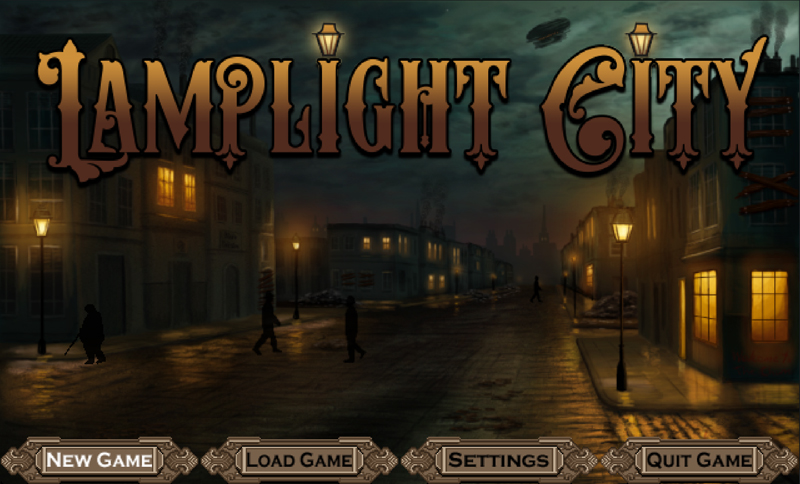
The universe of Lamplight City is rich, complex and oddly familiar. The game draws on that ever-popular theme of a steampunk alternative universe, adding dashes of Victorian squalor and just a pinch of 1950's detective tropes. Is it just a mishmash of clichés then? Yes, but it all works well together to form a likable and somewhat unique universe—like a cheesy movie, you can't help but fall in love with Lamplight City.
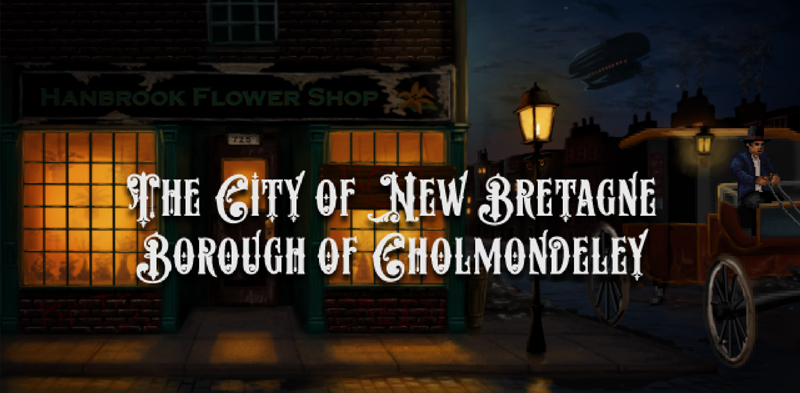
Figure 1. The Lamplight City Universe
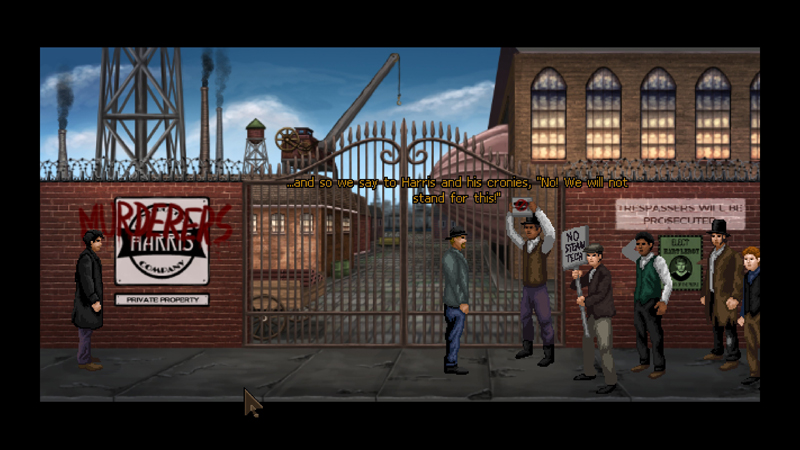
Figure 2. Some Protesters
In Lamplight City, you play Miles Fordham, a disgraced detective turned PI following the death of his partner in Act I at the hands of a mysterious killer. Miles is accompanied by the ghostly voice of his partner Bill as a sort of schizophrenic inner monologue. It's creepy, and it's a perfect example of taking a classic trope and turning it into one of the game's biggest strengths. Bill's monologues add witty flavour to the dry protagonist and a way to explain details and scenarios to the player.
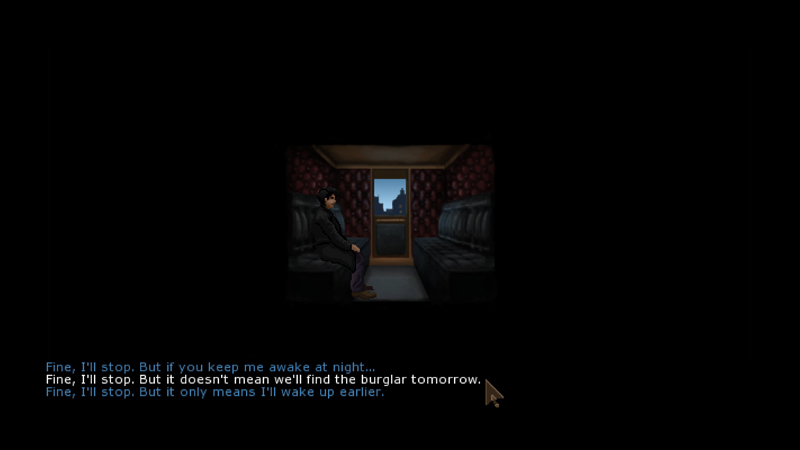
Figure 3. Miles Fordham's Schizophrenic Dialogue
Lamplight City features multiple cases that are all tied together with an overarching story. More impressively though is the overarching story's effect on the individual cases. In my play-through, mistakes I made in one case affected another and effectively led to another case becoming unsolvable. This is a system I instinctively hated. It seemed unjustly punitive to punish players for simply exploring dialogue options. Over time, however, as the music and art slowly enveloped me into a universe I truly enjoyed exploring and experiencing, I began to see how subtleties are at the center of this universe. What at first is dismissed as unimportant or underwhelming later appears as a subtle smack in the face, with that familiar feeling of "Oh, I knew I shouldn't have done that!"
Patience is most certainly a virtue in Lamplight City, which is not to say the game lacks flavor. In fact, the opposite is true. Many times it's down to you to sweep through the data and discern fact from fiction. It's important to note that Lamplight City isn't a logic game—not really. There's no inventory, and although there are elements of small physical puzzles, the game thrives on interpersonal relationships and dissecting dialogues, not using some half-forgotten wrench on a valve. It takes patience and discretion. This is not a simple mobile game where enough spamming clicks will win the game. Speaking of winning, let's talk about the end of the game—no spoilers, I promise!

Figure 4. Petri Dish
On my first play-through of the final case, I failed, miserably, and I loved it. Most games are too afraid to let the player fail. They'll respawn you, give you tips or let you skip to the next part. When I failed in Lamplight City, you can imagine my disbelief and slow, emerging grin as the credits began to roll, the biggest case of the game still unsolved. It's a nice breath of fresh air after the safe world of invincible super heroes and perfect protagonists found in many popular movies and games today.
All this is not to say, however, that you are doomed to failure. Lamplight City provides you with the opportunity to establish yourself in Miles Fordham. The universe of New Bretagne no longer feels distant but real. You are the master of your own fate, and you, the player, are brought into the fold and become invested in every lead and discovery. The game does a great job at portraying a sense of responsibility onto the player for making poor decisions, like annoying your wife, which in any other game wouldn't affect a mighty protagonist nor penalize a player for doing so.

Figure 5. Example Dialogue
So that's what Lamplight City does well, but there are plenty of areas where it's quite not so exceptional. At the end of the day, it feels like a small progression on a long-standing genre of point-and-click adventure games—a small evolution, if you will, instead of a revolution in game design. That's not necessarily a bad thing if you're looking for a safe game you know you'll probably enjoy, but if you're looking to be tested or truly excited by an innovative game, Lamplight City isn't for you. With that said, the story is pleasantly compelling, and even if the gameplay itself isn't riveting, the story is comparable to a long book, slowly reeling you into its universe without you noticing until 2am when you can't put the game down until you've gotten to the bottom of the case.
Just like other games of its genre, there are moments when you'll be stuck and cursing to high heaven that you wish you'd payed more attention to dialogue or details of previous cases. The game does a good job of keeping you informed through a case book that contains the most relevant information and clues, but this won't stop you from gallivanting across the city multiple times a case talking with every NPC and revisiting every room, hoping for some slight lead. I'll be honest; I watched my fair share of play-throughs to find the next clue. This isn't a fault of the game per se but a problem with the genre in general, often leaving players dazed and confused with little direction. It's a feature of the genre, and it can be extremely alluring or repulsive depending on the type of gamer you are. This game sticks with its hard-core roots of butterfly-effect dialogues, refusing to implement a hints system as in other similar games, sometimes making it frustrating.
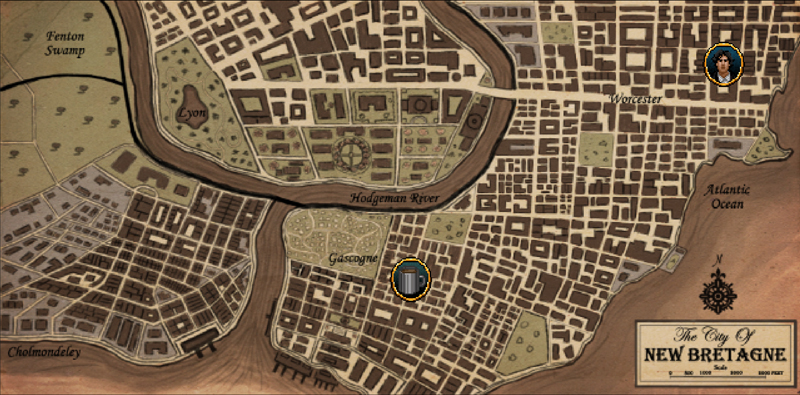
Figure 6. Map of New Bretagne
Finally, Lamplight City is a relatively short game at around ten hours for a price tag of $15 USD. This falls far short of large "triple A games" with thousands of developers creating vast expanses of land and hundreds of characters with which to interact. However, with multiple endings, more than 50 voiced characters and a uniquely charming art style, Lamplight City has a great replay-ability value, and there are still cases I haven't totally solved. The price, although not entirely competitive with huge games, is fair enough for an intriguing and engaging story that will undoubtedly have you playing again!
Lamplight City was released September 13, 2018. The game was developed by Grundislav Games and published by Application Systems Heidelberg. It's available for SteamOS + Linux, Mac OS X and Windows.
You can purchase Lamplight City from the Steam Store.
Patrick Whelan is a second-year student at Edge Hill University in the UK. He is an aspiring developer, blogger and all-round hacker.